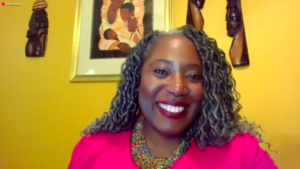How to transform communication practices to be more inclusive
By Ruba Hassan | Feb. 8, 2023

February is Black History Month, and universities and colleges across Canada are leading talks, events and initiatives to commemorate it. This month is an important time to reflect on our society’s often flawed past, and renew our commitments to do better in the future.
The violent 2020 murder of Black U.S. citizen George Floyd by a White police officer sparked calls for action to combat anti-Black racism, and achieve true equity, diversity and inclusion for Black people across all spheres of life.
IABC/Toronto’s Professional Independent Communicators (PIC) Feb. 2 webinar “Beyond the Boardroom – Creating a Culture of Conscious Collaboration”, held in recognition of Black History Month, generated useful insights that can help shape how higher ed communicators operate. How do we as communicators ensure that EDI principles guide our organizations’ strategy and create real change, internally and externally? The answer, as the panelists shared, starts in our intentions.
Navigating the communications industry as a Black professional

As professional communicators, we play an important role in holding up our institutions to a high standard, said Christopher Trotman, owner of Trotman Communications and director of stakeholder engagement at Trinity Centres Foundation, which transforms underused churches into community hubs and affordable housing.
“We are the eyes and ears of the organizations that we work for. We help to define the strategies that they use to move forward in the world,” said Trotman, co-director of programming for PIC.
But as the panelists shared from their experiences navigating the communications industry, this mission can be especially taxing for a Black communicator. Karen White-Boswell, director of external communications at supermarket chain Sobeys, described a time when she faced blatant discrimination as the PR director for an organization. At a sustainability and equity conference, she was forced to sit at the back of the room and away from her employer, because of assumptions the organizers made based on her skin colour.
“There are still days that I feel crushed.”
White-Boswell, who is also vice chair of Second Harvest’s board of directors, admitted that even at this stage of her career as a professional communicator, such experiences have taken a toll on her: “There are still days that I feel crushed.”
The importance of allyship
Higher ed communicators must be conscious of issues facing equity-seeking groups in their communications with students, prospects and other stakeholders. However, it is also important to reckon with these issues internally—in day-to-day collaborations with colleagues, in institutional hiring practices, and in goals and strategies that guide the vision of our institutions. The panelists stressed that this is where allyship becomes important.

Ruth Kupolati, a media planning strategy assistant at Publicis Media, said that having supportive colleagues and leaders has helped her feel that she was on the right team. She spoke fondly of managers who regularly checked in with her, were invested in her development, were interested in learning about her culture and, most importantly, stood up for her when she was being undermined or faced racism.
Kupolati also emphasized the importance of outreach to diverse communities, and intentionally recruiting Black and other diverse talent. The people we serve should be able to feel heard and see themselves represented in our teams, she explained.
Communicating authentically or not at all
Communicators must put a lot of thought into celebrating Black History Month so that their institutions’ messages do not feel like empty words with no action. A social media post to recognize the month that does not also reflect the institutions’ actions on EDI is not enough. In fact, for White-Boswell, staying silent is sometimes better.

“Part of conversation is listening. If you don’t have anything genuine to say, listen,” she said. “Listen to the community, listen to what the hurdles are, listen to how you can truly come to the table to make a difference.”
Accepting criticism is never easy, she said, but it is the first step institutions must take if they truly desire change. Listening to the community will help identify failures, she said, and which pain points need to be addressed.
In 2023, White-Boswell said, we should not still be talking about building space for our Black colleagues and students—they are already here, and they have a lot to offer. We should be “building capacity for Black people to be successful and fully engaged in an organization.”